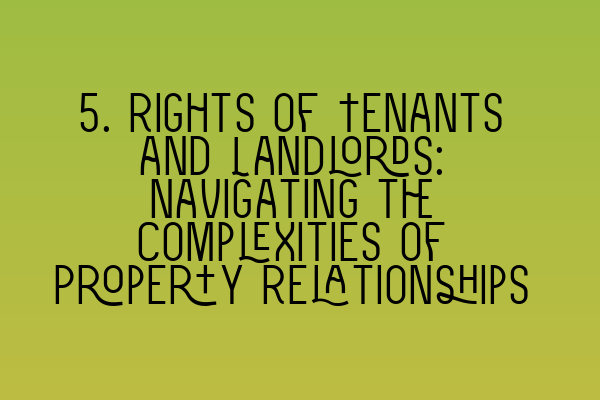5. Rights of Tenants and Landlords: Navigating the Complexities of Property Relationships
Property relationships between tenants and landlords can be complex and filled with legal nuances. It is crucial for both parties to understand their rights and obligations to ensure a harmonious and legally sound agreement. In this blog post, we will explore the rights of tenants and landlords, shedding light on their respective legal positions and offering valuable insights to navigate these intricate dynamics.
1. Rent and Tenancy Agreements
The cornerstone of any tenancy relationship is the rent and tenancy agreement. This agreement serves as a legally binding contract between the tenant and landlord, outlining the terms and conditions of the tenancy. It is essential for both parties to have a clear understanding of the agreement, as it establishes their respective rights and obligations.
Rent is a fundamental aspect of the tenancy relationship. It is vital for landlords to understand their ability to charge rent and increase it over time within legal limitations. Tenants, on the other hand, should be aware of their rights in terms of rent payment methods, rent increases, and rent arrears.
To learn more about the intricacies of rent and tenancy agreements, check out SQE 1 Practice Exam Questions.
2. Maintenance and Repairs
An important aspect of property relationships is the maintenance and repair of the rented property. Landlords have an obligation to maintain the property and keep it in a habitable condition, whereas tenants are responsible for reporting any issues and taking reasonable care of the premises.
Understanding who is responsible for specific repairs and maintenance tasks can sometimes be challenging. It is crucial for both tenants and landlords to comprehend their rights and obligations in this regard. This knowledge will help avoid conflicts and ensure that the property remains in good condition throughout the tenancy.
If you need further guidance on maintenance and repairs, take a look at SQE 1 Practice Mocks FLK1 FLK2.
3. Tenancy Deposits
Tenancy deposits play a significant role in property relationships, offering protection to both tenants and landlords. It is essential for landlords to handle deposits correctly, in compliance with the relevant legislation, to avoid potential disputes or legal complications.
Tenants, on the other hand, should familiarize themselves with their rights regarding tenancy deposits, including the return of the deposit at the end of the tenancy. They should also have a clear understanding of the procedures for raising disputes and seeking appropriate remedies in case of unfair deductions or withheld deposits.
If you’re interested in learning more about tenancy deposits, don’t miss out on our SQE 2 Preparation Courses.
4. Evictions and Termination
Evictions and termination of tenancy are delicate matters that need to be handled carefully and in accordance with the law. Both landlords and tenants should be aware of the specific procedures and regulations governing eviction, as well as the various grounds upon which a tenancy can be terminated.
Understanding the rights and obligations related to eviction and termination will help parties navigate these situations with less stress and avoid legal consequences. It is crucial for landlords to follow proper legal procedures when seeking eviction, and for tenants to be informed of their rights and potential remedies in case of wrongful eviction.
For more information on the legal aspects of eviction and termination, we recommend exploring our SQE 1 Preparation Courses.
5. Dispute Resolution
Disputes can arise between tenants and landlords for various reasons, such as rent arrears, maintenance issues, or disagreements over the terms of the tenancy agreement. When conflicts arise, it is essential for both parties to understand their options for dispute resolution.
Mediation and arbitration can be effective methods to settle disputes without going to court, offering a quicker and less costly alternative. However, understanding when and how to engage in these processes is crucial for a successful resolution.
To stay up to date with relevant legal information and the latest SRA SQE Exam Dates, visit our SRA SQE Exam Dates page.
By having a clear understanding of their rights and obligations, tenants and landlords can navigate the complexities of property relationships more effectively. It is always recommended to seek professional legal advice to ensure compliance with the law and to protect your rights and interests.
If you need guidance or assistance with property law matters, our team of knowledgeable and experienced solicitors at SQE Property Law & Land Law is here to help. Contact us today to discuss your requirements and get expert advice tailored to your situation.
